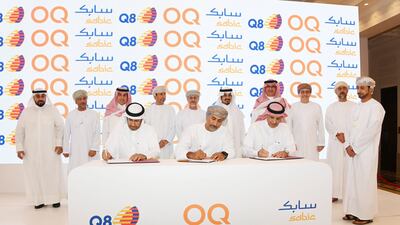Saudi Basic Industries Corporation, better known as Sabic, has signed an agreement with Oman’s state energy company OQ and Kuwait Petroleum International to set up a petrochemical complex in the sultanate.
The project, which includes a steam cracker and a natural gas liquids (NGLs) extraction plant, will use feedstock from Oman’s Duqm refinery, which is run by a venture between OQ and KPI, the companies said on Wednesday.
The complex will manufacture petrochemical products for markets linked to the energy transition process, clean technology, mobility, and construction, among others.
“This agreement enables us to identify and assess opportunities for ambitious and sustainable growth by bringing together our capabilities, expertise and technologies, and working collectively with our partners,” said Sabic chief executive Abdulrahman Al Fageeh.
The petrochemicals industry is expected to be a major driver of crude oil demand in the next few decades as consumers increasingly switch to electric vehicles.
Globally, the sector is projected to be worth about $800 billion by 2030, up from about $475 billion in 2020, according to Precedence Research.
Petrochemicals are set to account for more than a third of the growth in oil demand in the period up to 2030, and nearly half in the run-up to 2050, ahead of lorries, aviation and shipping, according to the International Energy Agency.
Their production is also poised to consume an additional 56 billion cubic metres of natural gas by 2030, equal to about half of Canada’s total gas consumption today, the energy agency said.
“The agreement is a significant milestone reached between the partners and comes at an important time in Oman, along with our 52nd national day celebrations and the near completion of the OQ8 refinery project,” OQ group chief executive Talal Al Awfi said.
The refinery, whose construction is nearing completion, is situated within the Duqm Special Economic Zone in Oman's south-eastern Al Wusta province.
The strategic maritime location provides immediate access to international shipping lanes in the Indian Ocean and Arabian Sea.
Once complete, the refinery will have the capacity to process about 230,000 barrels of crude oil a day.
“We are pleased to work side by side with OQ and Sabic on this pioneering project in Oman, because working with our regional partners supports KPC's 2040 strategy for growth in the petrochemical industry and enhances integration between the refining and petrochemical sectors,” said KPI president and chief executive Shafi Al Ajmi.
“The project also supports the economic growth and development of the Special Economic Zone at Duqm.”
As is the case with other Gulf countries, Oman is benefitting from a surge in economic activity tied to higher oil prices.
Brent, the benchmark for two thirds of the world’s oil, is currently trading at about $83 a barrel after falling to less than $30 in 2020.

